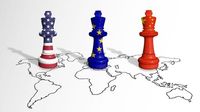Data protection is more than just a legal or technical issue; it reflects cultural values, political objectives, and economic strategies. The three major global players—the European Union, the United States, and China—pursue markedly different approaches to data protection, highlighting profound differences in philosophy and practice between fundamental rights, consumer protection, and state interests.
In the European Union, data protection is considered an inalienable fundamental right and a central component of human dignity and individual freedom. Here, the protection of privacy takes precedence over economic or governmental interests. Conversely, the United States views data protection primarily as part of consumer protection, emphasizing individual agreements and contractual freedom rather than unified regulations. This leads to a more fragmented approach, where businesses are held accountable primarily through self-regulation.
China, on the other hand, adopts a state-centered approach. In this context, data protection is not a shield for the individual but a tool for ensuring social stability and strengthening national interests, accompanied by significant state oversight.
The EU has established a globally recognized standard with the General Data Protection Regulation (GDPR), which guarantees citizens' informational self-determination and creates a uniform legal framework for all member states. In contrast, the United States lacks a centralized regulation, resulting in a patchwork of state laws and industry-specific guidelines, such as the California Consumer Privacy Act (CCPA) and the Health Insurance Portability and Accountability Act (HIPAA).
In 2021, China enacted the Personal Information Protection Law (PIPL), which incorporates elements of the GDPR but emphasizes state control over data use. While the GDPR grants citizens extensive rights—including the right to information, correction, deletion, and objection—these rights in the U.S. vary significantly by state and industry, often prioritizing economic interests over individual protections.
The GDPR also imposes strict control mechanisms and the potential for hefty fines, reaching up to four percent of a company's global annual turnover for violations. In the U.S., enforcement is primarily in the hands of the Federal Trade Commission (FTC) and individual states, with generally lower penalties. Meanwhile, China’s approach involves state-controlled sanctions that can be high but are often applied selectively, using data protection as a political tool alongside social monitoring systems like the "Social Scoring" initiative.
According to the 33rd Data Protection Report, Bundestag President Julia Klöckner recently engaged in discussions with Federal Commissioner for Data Protection and Freedom of Information, Prof. Dr. Louisa Specht-Riemenschneider, about the potential for utilizing digital data more efficiently without compromising data protection standards. Klöckner noted that public perception often views data protection as an obstacle, leading to missed opportunities for easier data usage and digital advancement.
She emphasized the need for early consultation with companies and institutions regarding data protection, stating, "This way, data protection can facilitate plans and projects instead of preventing them. This shift in fundamental thinking should be our goal!" This perspective highlights a desire to reframe data protection not as a hindrance but as a means to enable innovation and progress.
Furthermore, the conversation touched on the importance of digital sovereignty for the Bundestag. Klöckner pointed out that the parliament must not rely on foreign communication platforms and messaging services, whose security standards are often difficult to assess. Instead, it is crucial to access secure, domestic solutions to ensure the integrity and safety of parliamentary communications.
As of April 12, 2025, the discourse surrounding data protection continues to evolve, reflecting the varying cultural, political, and economic landscapes across the EU, U.S., and China. Understanding these differences is essential for grasping how the digital world operates and how the concept of data protection can be interpreted based on who holds the reins.
In conclusion, data protection has become a geopolitical currency. While the EU places citizens at the center of its framework, the U.S. balances market freedom with consumer rights, and China leverages data as a strategic resource. As digital landscapes expand, the implications of these differing approaches will undoubtedly shape the future of privacy, security, and individual rights on a global scale.



